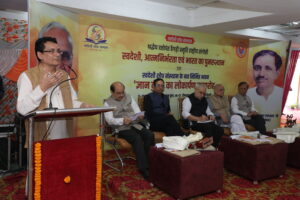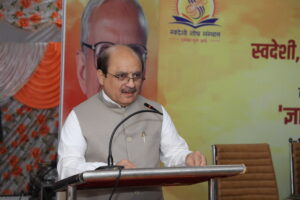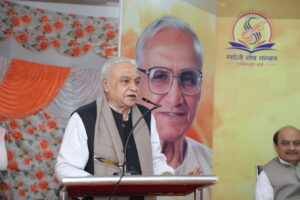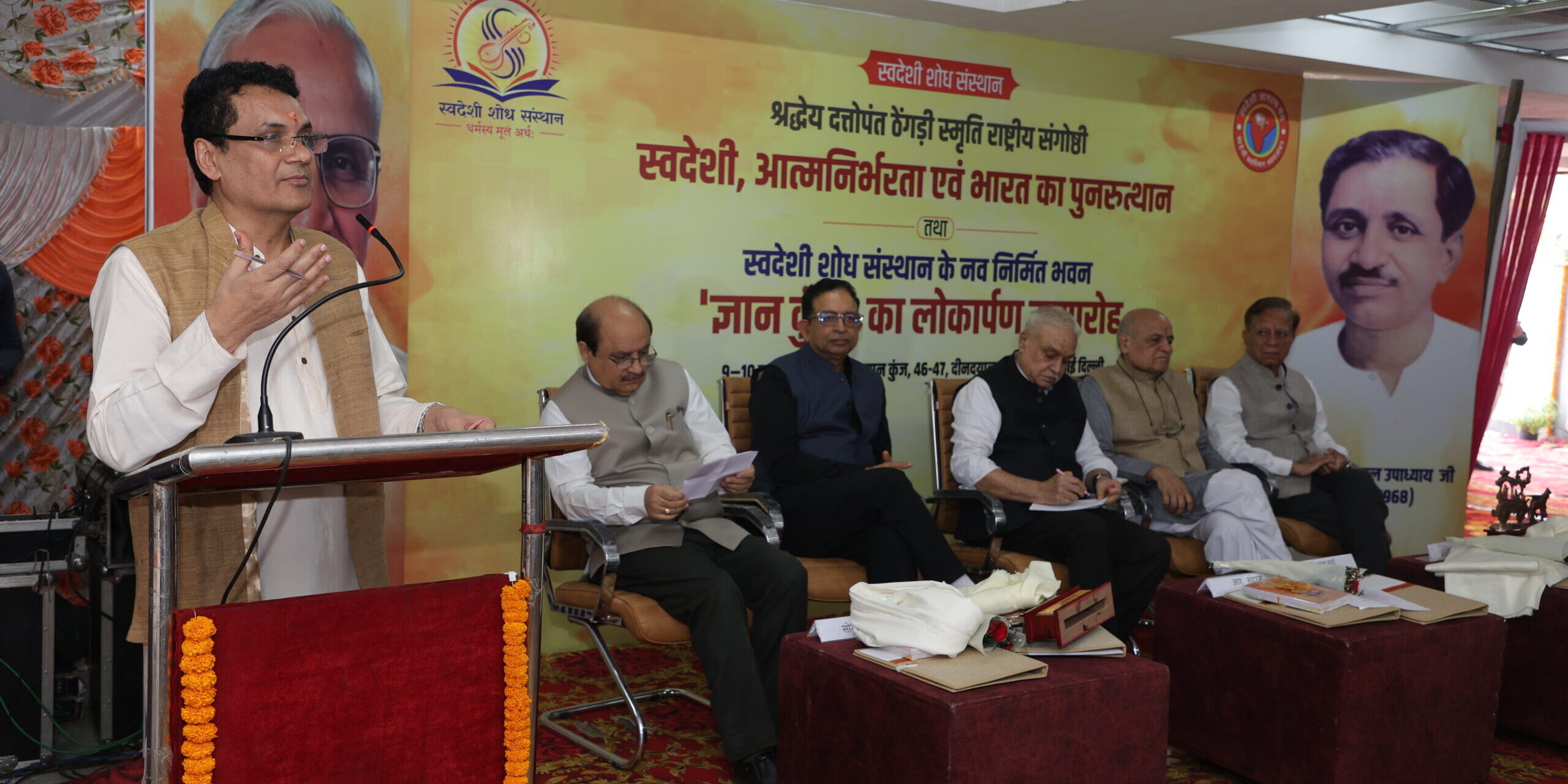Shradheya Dattopant Thengdi Commemorative National Seminar
Session 1 Report (Inaugural Session)
Theme: Swadeshi, Self-Reliance & Resurgence of Bharat
Date: Nov 9, 2025
Time: 10:00 AM
Venue: Stilt Area, Gyan Kunj
Speakers: Prof. Somnath, A. Bhartiya Adhikaris of SJM, Prof. Bhagwati Prakash, Sh. R Sundaram ji

Incharge: Prof. Pradeep, Dr. Sarabjeet
The inaugural session of the Shradheya Dattopant Thengdi Commemorative National Seminar began on the morning of November 9, 2025, at Gyan Kunj with a profound sense of reverence and intellectual anticipation. Organized under the broad theme Swadeshi, Self-Reliance & Resurgence of Bharat, the session set the tone for the day-long deliberations on the vision and philosophy of one of Bharat’s most integral thinkers—Dattopant Thengdi ji, whose 105th Jayanti this year coincided with the seminar.
Commencement and Opening Remarks
The inaugural session commenced with the ceremonial Deep Prajwalan, symbolizing the enlightenment of thought and action. Dr. Rajkumar Goyal performed the ritual, marking the auspicious beginning of a day dedicated to reflecting upon Thengdi ji’s vision for a self-reliant and ethically prosperous Bharat.
Session incharge and anchor, Prof. Pradeep, introduced the theme and dignitaries, highlighting the continuity between the Swadeshi philosophy and contemporary calls for economic and cultural self-reliance. The tone of the seminar was insightfully set by Prof. Somnath Sachdeva, who in his inaugural address, traced the journey of India’s economic independence, beginning from 1947 when the nation faced the profound challenge of sansadhan sthapana (institutional and resource building). He reflected on how Swadeshi, as envisioned by Thengdi ji, remains not just an economic doctrine but a moral compass for national reconstruction.
Commemorating the Visionary – Dattopant Thengdi
Prof. Somnath’s remarks also paid homage to Shradheya Thengdi ji, recalling his birth on November 10, 1920, in Arvi, Maharashtra. He emphasized Thengdi ji’s pioneering role in establishing the Bharatiya Mazdoor Sangh, Bharatiya Kisan Sangh, and Swadeshi Jagaran Manch—organizations that became the living embodiments of his philosophy of harmonious labour, ethical enterprise, and national regeneration. His commitment to Gram Swaraj, Atmanirbharta, and the spiritual foundation of economy were echoed in all the day’s deliberations.
Distinguished Speakers and their Insights
The session brought together eminent scholars and practitioners who have carried forward the torch of Swadeshi in multiple domains.
 Dr. Somnath Sachdeva elaborated on the holistic vision of self-reliance, pointing out that Thengdi ji’s concept of Swadeshi was not isolationist but integrative in nature, seeking to harmonize economy with ethics, polity with culture, and technology with humanity. He spoke on the strategic importance of resource creation post-1947 and the continuing need to align the nation’s development trajectory with indigenous capacities.
Dr. Somnath Sachdeva elaborated on the holistic vision of self-reliance, pointing out that Thengdi ji’s concept of Swadeshi was not isolationist but integrative in nature, seeking to harmonize economy with ethics, polity with culture, and technology with humanity. He spoke on the strategic importance of resource creation post-1947 and the continuing need to align the nation’s development trajectory with indigenous capacities.- Shri Rajkumar Goyal, Vice Chairman of DGIF and Managing Director of SLR Mechanics, shared insights from the industrial perspective. He highlighted how domestic technological innovation and mechanical design can strengthen India’s manufacturing backbone, adding credibility to the Swadeshi industrial model.
- Shri R. Sundaram, National Convenor of Swadeshi Jagaran Manch and a Chartered Accountant, delivered the Presidential Address. He reflected on his journey within the movement since becoming Tamil Nadu State Convenor in 1994, recalling the challenges and triumphs of Swadeshi advocacy. Sundaram ji emphasized that the world today faces technological and political disruptions, but Bharat must rise by embracing rather than fearing them. He asserted, “Technology is power when rooted in values.” His address exposed the inherent limitations of unregulated globalisation, urging the youth and enterprises to pursue manufacturing excellence while maintaining autonomy in foreign trade. He underlined that economic power backed by cultural integrity should guide India’s trajectory toward global leadership.

- Prof. Bhagwati Prakash Sharma, Co-Convenor of Swadeshi Jagaran Manch and a renowned economist, presented a scholarly narrative on Bharat’s Journey: From a Glorious Past to a Self-Reliant Future. His oration beautifully bridged ancient achievements with modern aspirations. He recounted archaeological and historical evidence reflecting India’s advanced knowledge systems, from the underwater remains of Dwarka dated to 5000 years, to metallurgical marvels like the 2000-year-old Iron Pillar of Delhi and 2500-year-old stone structures in Karnataka. Drawing from Rigvedic references, he described early medical innovations such as limb replacements, illustrating the scientific ethos embedded in India’s civilizational heritage.
Prof. Sharma then turned to present-day economic data, contextualizing India’s demographic and industrial potential. Citing that India holds 17.8% of the world’s population and contributes 3.8% to global manufacturing, he stressed the urgency to augment this ratio through Swadeshi-led production and innovation. With an estimated 100 crore working-age citizens by 2030, he envisioned a 40 trillion-dollar Indian economy if every capable individual contributed meaningfully to national productivity. He pointed to India’s second-largest educational system and the vast base of 9 crore MSMEs as anchors of future socioeconomic dynamism. His examples, such as the inspiring journey of Jagdish Raj Mahindra from small-scale entrepreneurship to global industry, reinforced the transformative power of indigenous enterprise.
- Shri Vijay ji, President of Rice Mill Association, shared grassroots innovations being pursued in collaboration with researchers from IIT Kharagpur and IIT Delhi. Their pioneering work on rice plant development aims to enhance nutritional content, particularly addressing vitamin C deficiency, through scientific yet ecologically sustainable means. This initiative exemplified the Swadeshi philosophy, local resources elevated by national research and innovation.
- Prof. Raj Kumar Mittal, Vice-Chancellor of Babasaheb Bhimrao Ambedkar University, Lucknow, highlighted the necessity of integrating economic policy with moral and educational reform. He invoked the classical principle Dharmasya Moolam Artha, that even Dharma, the moral order, rests upon rightful economic foundations. Self-reliance, he argued, must be built on the triad of ethical wealth, indigenous production, and cultural cohesion.
Other speakers, including Shri Dhanpat Rao Aggarwal and IPS officer Shri Sanjay ji, reflected on the administrative and governance dimensions of national resurgence. Shri Sanjay ji shared experiences from Himachal Pradesh’s police reforms between 2020 and 2024, illustrating how discipline, transparency, and technological modernization can go hand in hand with Swadeshi values.
Reflections on Economic Self-Reliance
The session revisited India’s trade relations, recalling the trade deficit with China during 2016–17 as a reminder of the risks of over-dependence on external economies. Several participants discussed how regional entrepreneurship, sustainable architecture, and traditional craftsmanship (as shared by architects Praveen Mittal and Manoj Gupta, and craftsman Prakash ji from Kullu) can together reassert India’s cultural and material independence. Their insights highlighted how even local practices such as Himachali wood architecture manifest Swadeshi as a living, evolving ethos.
Thematic Essence
Throughout the session, one thematic current persisted—the belief that Bharat’s resurgence must spring from within. The articulation of Swadeshi went beyond economic autonomy; it was portrayed as a moral-cultural renaissance rooted in India’s civilizational wisdom. As the economic, educational, and scientific narratives converged, every speaker reaffirmed the inseparability of material progress and spiritual grounding.
Concluding Reflections
In his closing remarks, the session incharge, Prof. Pradeep, summarized the central ideas emerging from the deliberations. He reaffirmed that the revival of Bharat’s self-reliance requires not only industrial and technological capabilities but also a revival of values—self-belief, ethical labor, and dedication to national service. Citing Thengdi ji’s lifelong devotion to service, he reminded participants that the spirit of Swadeshi must animate every sphere—economic, social, political, and educational.
The inaugural session thus stood as a vibrant confluence of thought, experience, and vision—a tribute not merely to the memory of Shradheya Dattopant Thengdi, but to the continuing evolution of his legacy in the service of a self-reliant, dharmic, and resurgent Bharat.






